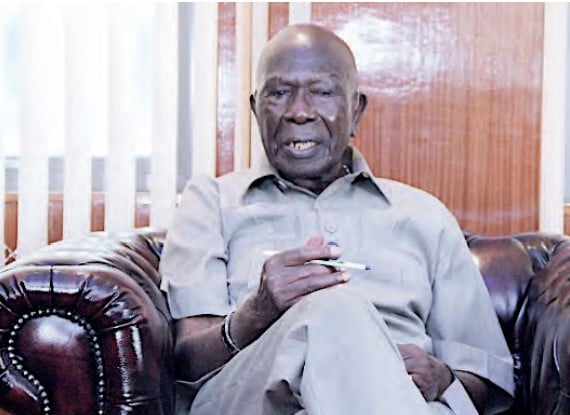
Many questions rang through our minds as we prepared to interview one of the most astute politicians in Kenya, retired Vice President Arthur Moody Awori.
Commonly known as “Uncle Moody,” the veteran, who was born on December 5, 1928, served as the ninth Vice President of Kenya from September 25, 2003 to January 9, 2008.
Awori was first elected as the Member of Parliament for Funyula in the Busia district in 1982 and was active until 2008 when he lost to Paul Otuoma and subsequently retired from politics.
As we walked into his reception, a relatively older handler, who has been with the retired VP since his time as MP, received us.
“Karibuni. Mzee yuko, alikuwa anawangojea (Welcome. Mzee has been around waiting for you),” the handler said as he led us into the waiting room.
The area is cool with very little movement, save for a few personnel who work for the veteran.
After waiting for about five minutes, we were told Awori was ready to see us. Donning his traditional grey Kaunda suit, Awori also wore a smile, as he always did during his political hay days.
Even at 95 years of age, his memory is still sharp, his sense of humour evident and he walked without a stick. Awori requested we not discuss politics and his life after.
“I will restrict myself to CDF and its successes; I need more than a week to prepare to talk about my political career and life in retirement,” he said while smiling.
“I have received calls from many people who want to write about my life, but am not yet ready for that.”
For several years, many regions in Kenya suffered from underdevelopment due to political marginalisation, as resources were often directed to politically favoured areas.
This led to disparities in access to basic services such as education, healthcare and infrastructure.
However, the establishment of the National Government Constituencies Development Fund, formerly CDF, through an Act Of Parliament in 2003, has played a significant role in addressing these disparities.
The fund has catalysed growth in various sectors by promoting equitable socio-economic development countrywide.
Bursaries and other investments made through the NG-CDF in educational facilities have increased school enrollment rates in rural communities, thus reducing barriers to education.
With decades of political experience, Awori shared his beliefs about the potential of CDF and the pitfalls it has faced since its inception.
The initiative, which has sparked much debate, has offered a glimmer of hope and progress for rural areas traditionally neglected by central government initiatives.
“I think it was probably the best idea that has ever come to Kenyans since independence,” Awori said.
“Historically, the national government brought projects to rural areas without consulting the needs and wants of the people.”
This disconnect often resulted in initiatives that did not cater to the specific requirements of communities, leading to further stagnation in development.
Under CDF, funds were allocated primarily toward development in education and health facilities.
“The biggest portion went to building or rehabilitating schools and health centres,” he recounted.
“We wanted to ensure that no one had to journey too far from home for essential services.”
For Funyula, where the infrastructure was historically poor, the impact of CDF was significant. Roads were improved, health centres built and education became more accessible to young people in the constituency.
Before its implementation, political representatives in rural areas had to rely on their own resources to enact change.
“I had to organise fundraisers and reach into my own pockets. Everything depended on me.”
The former VP built what is now known as the Moody Awori Primary School, well before the CDF initiative, a project he takes pride in.
The arrival of CDF funds meant that local needs could finally be addressed with a unified strategy, as Awori and his team established criteria for the allocation of these resources based on urgency and need.
“Bringing Funyula together as one unit was one of our biggest challenges. For a long time, there were divisions. Some areas felt sidelined and addressing everyone’s needs was paramount.”
By engaging community members, Awori ensured projects were fairly evaluated and funds directed where they were most required.
“The criteria were centred around need; we aimed to improve what was lacking.”
In his advice to those managing CDF today, Awori emphasised the necessity of integrity and honesty.
“It’s vital to remember that this
money comes from taxpayers.
When tempted by the allure of
funds, CDF managers must remain
steadfast in their commitment to
uphold the trust that the public has
placed in them.”









